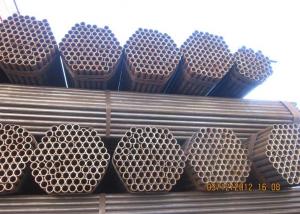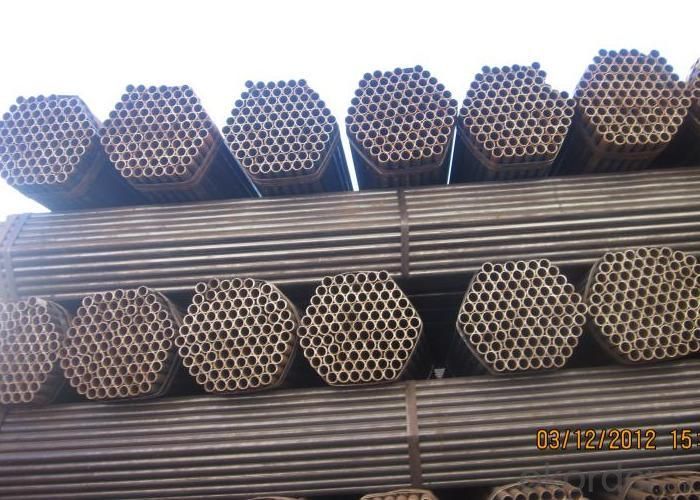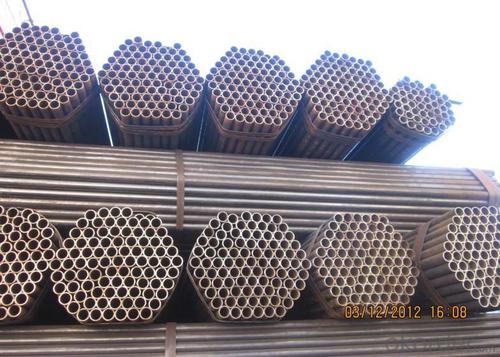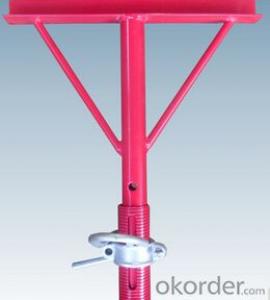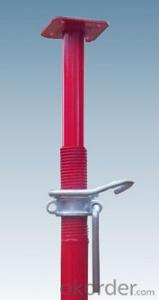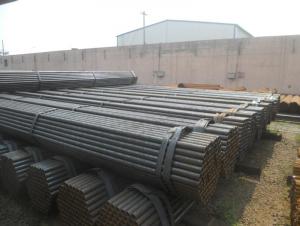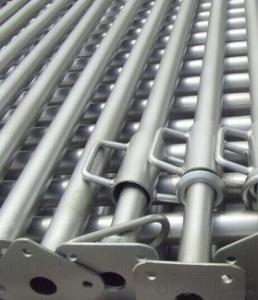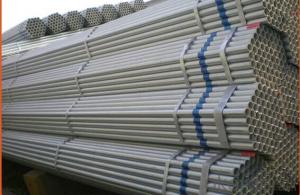Construction Scaffolding Pipe
- Loading Port:
- China Main Port
- Payment Terms:
- TT or LC
- Min Order Qty:
- 50 Tons m.t.
- Supply Capability:
- 5000 Tons Per Month m.t./month
OKorder Service Pledge
OKorder Financial Service
You Might Also Like
Quick Details of Construction Scaffolding
1.Thickness: 2-4mm 2.outer diamiter: 35~60mm 3.materials:Q235/Q255/Q345
4.Surface:hot dip galvanized,painted galvanized.
the chemical composition of raw materials | the mechanical property of raw materials | ||||||||||
item | Chemical composition % | Item | mechanical property | ||||||||
steel | steel number | C | Mn | S | P | Si | Al | steel | yield point Mpa min | tensile strength Mpa | elongation % min |
S235GT | 1.0106 | < 0.20 | < 1.40 | < 0.045 | < 0.040 | < 0.05 | > 0.020 | S235GT | 235 | 340--520 | 24 |
Standard: BS EN39 Loose steel tubes for tube and coupler scaffolds -- Technical delivery conditions | |||||||||||
other material: A500 A, B, C , D. A53 A, B. S275, S355, C250, C350 | |||||||||||
1) surface treatment: galvanized , oiled, painted , bare | |||||||||||
2) end treatment: beveled , plain , threaded | |||||||||||
3) test:chemical component analysis, mechanical properties ,technical properties , exterior size inspection | |||||||||||
4)application: fence. Construction. | |||||||||||
5)certificate: SGS inspection | |||||||||||
6)delivery time: usually in 20--30 days | |||||||||||
7) payment term: T/T , L/C, Western Union | |||||||||||
Application of Construction Scaffolding
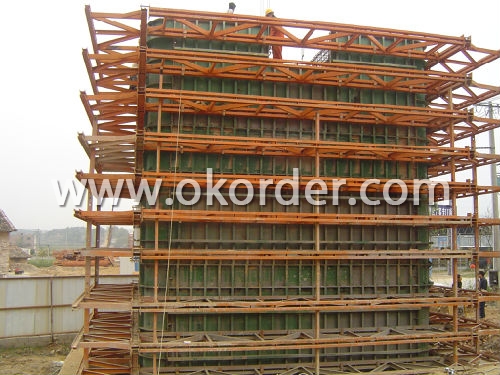
Application of Construction Scaffolding
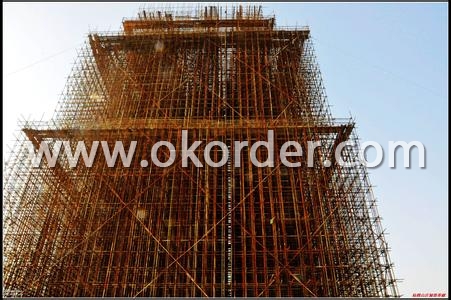
Packing of Construction Scaffolding
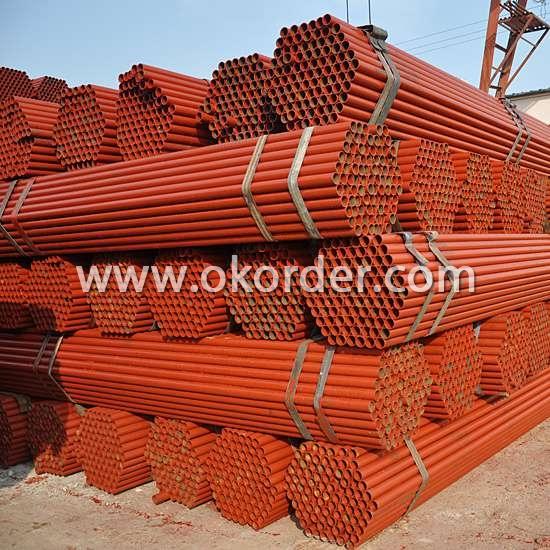
- Q: What is hot rolled steel pipe? What is a cold drawn steel tube?
- Overview of two processesHot-rolled (extrusion seamless pipe): billet, heating, perforation, three roll cross rolling, rolling or extrusion, tube to tube diameter (or reducing) - cooling - tube, straightening, pressure test (or testing), marking and warehousing.Cold drawing (rolling) seamless steel pipe: round tube to heating to perforation, annealing, pickling, leading to oil (copper), multi pass drawing (Leng Zha), the blank pipe, heat treatment, straightening, pressure test (testing), marking and warehousing.
- Q: How are steel pipes used in the manufacturing of power plants?
- Steel pipes are commonly used in the manufacturing of power plants for various purposes such as transporting fluids, gases, and steam. They are utilized for the construction of pipelines that carry water, fuel, and coolant to different parts of the power plant. Additionally, steel pipes are employed in the creation of boiler tubes and heat exchangers, which play a crucial role in the generation of steam and transfer of heat in power plants.
- Q: How are steel pipes recycled?
- Steel pipes are recycled through a multi-step process that involves collection, sorting, cleaning, and melting. First, the used steel pipes are gathered from various sources such as construction sites or industrial facilities. Then, they are sorted based on their size, shape, and quality. Next, any contaminants or coatings are removed from the pipes through cleaning and stripping processes. Finally, the cleaned pipes are melted down in a furnace, and the molten steel is formed into new pipes or other steel products. This recycling process reduces the demand for new raw materials and helps conserve energy and resources.
- Q: Are the welded and galvanized tubes the same weight?
- The same specifications of welded pipe and galvanized pipe weight is not the same, the general welding tube weight, galvanized pipe light.
- Q: Can steel pipes be used for underground sewage systems?
- Yes, steel pipes can be used for underground sewage systems. Steel pipes are known for their durability and strength, making them suitable for underground applications. However, it is essential to ensure that the steel pipes are properly coated or protected against corrosion to prevent damage from sewage and soil conditions.
- Q: What's the difference between hot-rolled seamless steel tube and cold-rolled seamless steel tube?
- Cold rolled seamless steel pipe (DIAL) in general, steel pipe for low and medium pressure boiler tube, high-pressure boiler steel pipe, alloy steel pipe, stainless steel pipe, oil cracking tube and other steel tube, including carbon thin-walled steel, alloy thin-walled steel, stainless steel, thin steel tube.
- Q: How are steel pipes insulated to prevent condensation?
- Steel pipes are typically insulated using materials such as foam or fiberglass that have low thermal conductivity. These insulating materials create a barrier that prevents the transfer of heat between the pipe and the surrounding environment, reducing the temperature difference and minimizing the chance of condensation occurring on the pipe surface.
- Q: Can steel pipes be used for high-pressure applications?
- Yes, steel pipes can be used for high-pressure applications. Steel pipes are known for their strength and durability, making them suitable for handling high-pressure fluids, gases, or steam in various industries such as oil and gas, construction, and manufacturing. They are designed to withstand the high internal pressure and are commonly used in pipelines, steam systems, and hydraulic systems where the pressure requirements are significant.
- Q: How are steel pipes joined together?
- Steel pipes are commonly joined together using various welding techniques, such as arc welding, butt welding, or socket welding. Additionally, other methods like threaded connections, flanges, or mechanical couplings can be used for joining steel pipes.
1. Manufacturer Overview
| Location | Hebei,China |
| Year Established | 2005 |
| Annual Output Value | Above 100 Million RMB |
| Main Markets | Main land;Middle East;Southeast Asia |
| Company Certifications | ISO9001 |
2. Manufacturer Certificates
| a) Certification Name | |
| Range | |
| Reference | |
| Validity Period |
3. Manufacturer Capability
| a) Trade Capacity | |
| Nearest Port | Tianjin;Qingdao |
| Export Percentage | 41% - 50% |
| No.of Employees in Trade Department | |
| Language Spoken: | English;Chinese;Korean |
| b) Factory Information | |
| Factory Size: | 120mu |
| No. of Production Lines | 11 |
| Contract Manufacturing | OEM Service Offered;Design Service Offered |
| Product Price Range | High Average |
Send your message to us
Construction Scaffolding Pipe
- Loading Port:
- China Main Port
- Payment Terms:
- TT or LC
- Min Order Qty:
- 50 Tons m.t.
- Supply Capability:
- 5000 Tons Per Month m.t./month
OKorder Service Pledge
OKorder Financial Service
Similar products
Hot products
Hot Searches
Related keywords
